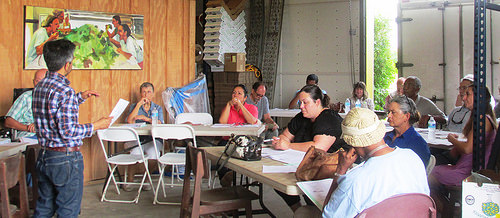
Helping Small Farmers in the South Go Organic
Rock Woods, Gulf States Regional Director for the National Center for Appropriate Technology (NCAT), knows the importance of persistence. Rock wanted to help more farmers in the southeast learn about organic certification, but he also knew that farmers are busy. That’s why Rock and NCAT launched a sustained engagement and outreach effort to reach potential organic farmers, and his persistence paid off!
February 11, 2016 | Source: USDA Blog | by Elanor Starmer, AMS Acting Administrator
Rock Woods, Gulf States Regional Director for the National Center for Appropriate Technology (NCAT), knows the importance of persistence. Rock wanted to help more farmers in the southeast learn about organic certification, but he also knew that farmers are busy. That’s why Rock and NCAT launched a sustained engagement and outreach effort to reach potential organic farmers, and his persistence paid off!
NCAT is one of 13 organizations that the USDA Agricultural Marketing Service’s (AMS) National Organic Program (NOP) partnered with to create educational materials that support the sound and sensible initiative to make organic certification more affordable, accessible, and attainable.
NCAT works to develop local and sustainable solutions to reduce poverty, promote healthy communities, and protect natural resources. The NCAT sound and sensible project focused on educating farmers and ranchers in the Gulf States region about organic production, as well as helping facilitate organic certification. By providing a series of training and informational workshops, along with follow-up and certification audit scheduling, NCAT succeeded in reaching its goal.
To start the process, Rock explored co-hosting organic farming and certification workshops with USDA-accredited organic certifier Quality Certification Services (QCS). The resulting workshops and on-farm demonstrations were held in five states – Alabama, Florida, Georgia, Louisiana, and Mississippi. Each workshop included a half-day in a classroom to learn about the USDA organic regulations and the certification process, followed by a half-day out at a farm.
For others interested in conducting these kinds of workshops, Rock recommends partnering with a USDA-accredited organic certifier; for the on-site farm visits, he recommends partnering with the certifying agent as well as state and local extension programs. He notes that farm visits are critical because they allow farmers to see and experience the organic regulations in practice. With a farm visit, producers can see first-hard what is allowed and prohibited in organic production, and how to prevent contamination and co-mingling of product. Rock also said that mock inspections, had a big impact by providing interested farmers with real-life examples of the organic requirements and the certification process.
Materials produced and used by NCAT, including the workshop itinerary, in-class presentation, pre and post tests, and more, are now available for use by other organizations. Access them at: NCAT South Organic Certification Workshop Tools You Can Use.
